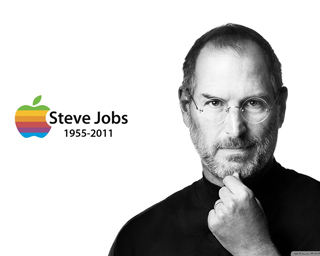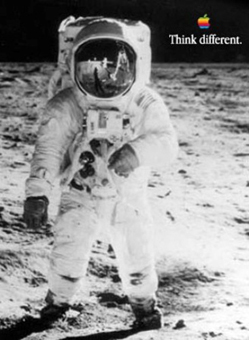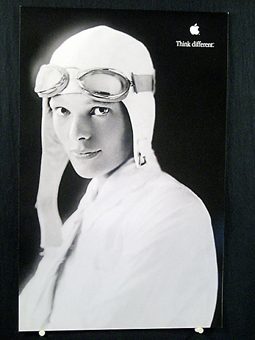Live Different:
The Beatitudes of Jesus
For Sunday February 2, 2014
Lectionary Readings (Revised Common Lectionary, Year A)
Micah 6:1–8
Psalm 15
1 Corinthians 1:18–31
Matthew 5:1–12
In 1997 Apple Inc. launched its "Think Different" advertising campaign. In television, print, billboards and posters, the series of ads featured 17 iconic game-changers of the twentieth century — people like Einstein, Gandhi, and Amelia Earhart. The campaign lasted until 2002 and won numerous awards.
"Think Different" exemplified Steve Jobs's minimalist aesthetic. It parodied IBM's old school mantra “Think" from 1911. It's also grammatically quirky in a playful way. We expect a conventional adverb, as in "think differently," whereas Jobs insisted on an unconventional noun, as in "think victory."
 |
Most of all, "Think Different" channeled Apple's counter-cultural vibe. Jobs had lured the Pepsi president John Sculley to Apple in 1983 with a famous challenge: "Do you want to sell sugared water for the rest of your life? Or do you want to come with me and change the world?"
“We’re here to put a dent in the universe," Jobs once said, "otherwise, why else even be here?”
In a 1994 interview with PBS called One Last Thing, Jobs explained his revolutionary-rebel theme:
"When you grow up you tend to get told the world is the way it is and your life is just to live your life inside the world. Try not to bash into the walls too much. Try to have a nice family life, have fun, save a little money.
That’s a very limited life. Life can be much broader once you discover one simple fact, and that is — everything around you that you call life, was made up by people that were no smarter than you. And you can change it, you can influence it, you can build your own things that other people can use.
The minute that you understand that you can poke life and actually something will, you know if you push in, something will pop out the other side, that you can change it, you can mold it. That’s maybe the most important thing. It’s to shake off this erroneous notion that life is there and you’re just gonna live in it, versus embrace it, change it, improve it, make your mark upon it.
I think that’s very important and however you learn that, once you learn it, you’ll want to change life and make it better, cause it’s kind of messed up, in a lot of ways. Once you learn that, you’ll never be the same again."
And so the "Think Different" narrative honored the crazy ones: "Here’s to the crazy ones. The rebels. The troublemakers. The ones who see things differently. While some may see them as the crazy ones, we see genius. Because the people who are crazy enough to think they can change the world, are the ones who do."
But wait a minute. Is "Think Different" really different? And is Apple Inc. really revolutionary? The ad campaign was brilliant. And there's no denying that computers, smart phones, search engines, and social media have revolutionized our lives.
 |
On a deeper level, though, "Think Different" was just more Silicon Valley hype, and no one sold the Kool-Aid better than Steve Jobs.
In his book You Are Not a Gadget (2010) Jaron Lanier laments the "cybernetic totalism" in Silicon Valley that's fueled by its own religious fervor and "sweet faith." In To Save Everything, Click Here (2013), Evgeny Morozov deconstructs the folly of "technological solutionism" — as if gadgets will solve all the problems of the world.
Dave Eggers fictionalizes this techno-hype and our cultural conformity to it in his new novel The Circle. A new college grad named Mae works at a dystopian tech company called "The Circle" that's led by the "Three Wise Men." It's an environment of enchantment: "My God," Mae thought, as she surveyed the corporate campus, "it’s heaven." The Circle exhibits all the characteristics of a cult, including the near impossibility of opting out.
And note the irony. Apple products aren't much different than Google or Samsung gadgets. At most there's a distinction without a difference. They're so similar that they sue each other over patent infringements.
Instead of individual creativity or rebel-revolutionaries, techno-ads and their products invite us to group conformity. That's the purpose of advertisement, however brilliant.
If you really dared to "think different", if you canceled Facebook and Twitter, or threw away your phone, you would pay a high price for your creative non-conformity — it would be an act of self-marginalization.
The desert monk Saint Anthony (d. 356) observed this stark contrast between authentic creativity and group conformity: "A time is coming when men will go mad, and when they see someone who is not mad, they will attack him, saying, 'You are mad; you are not like us.'"
In the Old Testament reading this week, Micah criticizes religious conformity in favor of a truly revolutionary life: "Do justice, love kindness, and walk humbly with your God." (6:8). Just how revolutionary would this be? Imagine kindness on Wall Street, humility in Hollywood, or justice in politics.
Our "gotcha!" journalism profits from slander, whereas the psalmist this week suggests a radical alternative: "Cast no slur on your neighbor."
 |
The Beatitudes in this week's gospel describe a genuinely counter-cultural style of life. In a world of wealth and war, says Jesus, blessed are the poor and the peacemakers. Instead of violence and vengeance, blessed are the mournful, the meek, and the merciful.
When the powerful forces of conformity tempt me to prove myself, there's always the example of Mary Oliver in her poem Today — who takes a day off to do nothing at all except to "let the voodoos of ambition sleep."
In The Mad Farmer Liberation Front, the poet-farmer Wendell Berry suggests ways to "practice resurrection." For example, "be joyful, / though you have considered all the facts." Or again, in whatever you might do, "Ask yourself: Will this satisfy / a woman satisfied to bear a child?"
To live the Beatitudes is to "live different" as one of the true "crazy ones." They take us off the grid, figuratively if not literally.
In his sermon on Romans 12:1–2, Martin Luther King, Jr. called this a life of "transformed non-conformity." Its permutations are as numerous as our individual personalities and life situations. In the epistle this week, Paul describes it as a life that chooses the foolishness of God over the wisdom of the world.
Image credits: (1) Wall75.com; (2) Flickr.com; and (3) Blogspot.com.





